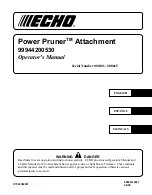
3
•
DO NOT FORCE THE TOOL
– at a rate faster than the rate at
which it is able to cut effectively.
•
USE THE RIGHT TOOL
– Do not use this tool for any job except
that for which it is intended.
•
DONʼT OVERREACH
– Keep proper footing and balance at all times.
•
DAMAGE TO UNIT
– If you strike or become entangled with a
foreign object, stop tool immediately, unplug, check for damage
and have any damage repaired before further operation is
attempted. Do not operate with a broken hub or spool.
•
DISCONNECT TOOL
– when not in use, when replacing line, or
prior to cleaning.
•
AVOID DANGEROUS ENVIRONMENTAL CONDITIONS
– Do
not use electric tools in damp or wet locations. Follow all
instructions in this Instruction Manual for proper operation of your
tool. Donʼt use the tool in the rain.
•
DO NOT OPERATE
portable electric tools in gaseous or
explosive atmospheres. Motors in these tools normally spark, and
the sparks might ignite fumes.
•
STORE IDLE TOOLS INDOORS
– When not in use, tools
should be stored indoors in a dry, locked-up place out of reach of
children.
•
STAY ALERT
– Watch what you are doing. Use common sense.
Do not operate tool when you are tired.
•
MAINTAIN APPLIANCES WITH CARE
– Follow instructions in
maintenance section. Keep handles dry, clean and free from oil
and grease.
•
CHECK DAMAGED PARTS
– Before further use of the
appliance, a guard or other part that is damaged should be
carefully checked to determine that it will operate properly and
perform its intended function. Check for alignment of moving
parts, binding of moving parts, breakage of parts, mounting, and
any other condition that may affect its operation. A guard or other
part that is damaged should be properly repaired or replaced by
an authorized service center unless otherwise indicated
elsewhere in this manual.
• DO NOT immerse tool in water or squirt it with a hose. DO NOT
allow any liquid to get inside it.
• DO NOT store the tool on or adjacent to fertilizers or chemicals.
• DO NOT clean with a pressure washer.
• Keep guards in place and in working order.
• Keep hands and feet away from cutting area.
SAVE THESE INSTRUCTIONS
The label on your tool may include the following symbols. The
symbols and their definitions are as follows:
V ..............volts
A ................amperes
Hz ............hertz
W................watts
min............minutes
..............alternating current
..........direct current
no ..............no load speed
..............Class II Construction
............earthing terminal
............
safety alert symbol
.../min ......revolutions or
reciprocations per minute
WARNING:
Some dust created by this product contains
chemicals known to the State of California to cause cancer,
birth defects or other reproductive harm. Some examples of
these chemicals are:
• compounds in fertilizers
• compounds in insecticides, herbicides and pesticides
• arsenic and chromium from chemically treated lumber
To reduce your exposure to these chemicals, wear approved safety
equipment such as dust masks that are specially designed to filter out
microscopic particles.
BATTERY CAP INFORMATION
Battery storage and carrying caps are provided for use whenever
the battery is out of the unit or charger. Remove cap before placing
battery in charger or unit.
WARNING:
Fire hazard
. Do not store or carry battery so that
metal objects can contact exposed battery terminals. For example,
do not place battery in aprons, pockets, tool boxes, product kit
boxes, drawers, etc., with loose nails, screws, keys, etc.
Transporting batteries can possibly cause fires if the battery
terminals inadvertently come in contact with conductive materials
such as keys, coins, hand tools and the like. The US Department of
Transportation Hazardous Material Regulations (HMR) actually




































